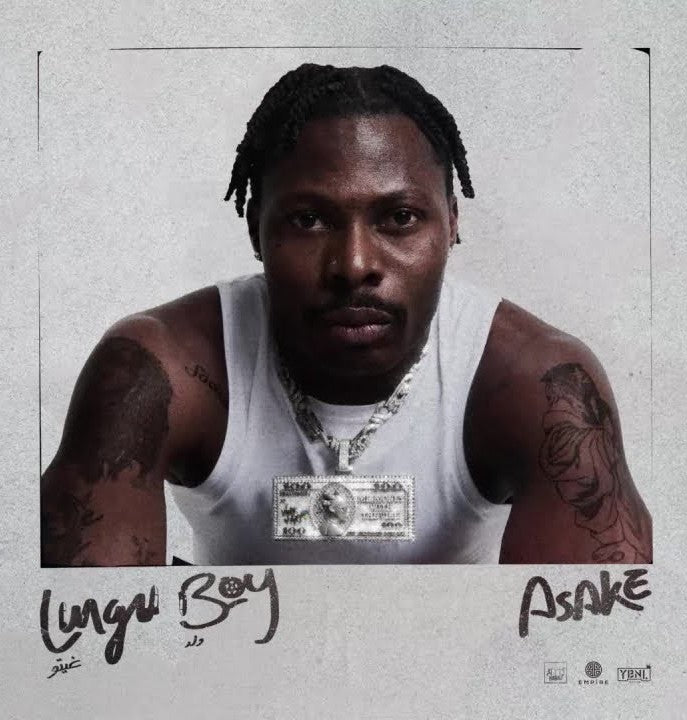
Celebrating Àṣàkẹ́: A Testament to Staying True to Your Roots
Share
Celebrating Àṣàkẹ́: A Testament to Staying True to Your Roots
Àṣàkẹ́, one of the most vibrant voices in Afrobeat today, continues to amaze us with his deep connection to his Yoruba heritage, even as he conquers global stages. His latest album, Lungu Boy, has set new records on Spotify Nigeria, and his upcoming tour promises to bring his unique blend of sounds to iconic venues like the O2 Arena and Madison Square Garden. But what truly sets Àṣàkẹ́ apart isn’t just his chart-topping hits or high-profile collaborations—it’s his unwavering commitment to expressing himself in Yoruba.
In a recent Instagram live session, Àṣàkẹ́ was asked why he always sings in Yoruba, even though he clearly has the ability to perform in English. His response was direct and powerful: “I am more comfortable singing in Yoruba, it’s not that I can’t sing in English. If you f*** with me, f*** with me with my Yoruba. If not, then don’t.” These words resonate deeply with many of us who understand the importance of language as a cornerstone of cultural identity.
The Power of Language in Music
Language is not just a tool for communication; it’s a vessel for culture, history, and identity. For Àṣàkẹ́, singing in Yoruba is not just a preference—it’s a declaration of who he is and where he comes from. In a world where many artists feel pressured to conform to the mainstream, often adopting English to reach a wider audience, Àṣàkẹ́’s choice to stay true to his native tongue is both bold and admirable.
His music, filled with Yoruba phrases and proverbs, offers listeners a gateway into the rich tapestry of Yoruba culture. Whether you understand every word or not, the rhythm and emotion in his songs transcend language barriers, allowing everyone to feel the depth of what he’s conveying.
Celebrating Lungu Boy and Àṣàkẹ́'s Journey
Lungu Boy is Àṣàkẹ́’s third album, and it’s nothing short of a cultural phenomenon. Featuring collaborations with global superstars like Wizkid, Travis Scott, and Stormzy, the album seamlessly blends traditional Yoruba elements with contemporary sounds. Despite the international appeal, the core of the album remains undeniably Yoruba. It’s this authenticity that has earned Àṣàkẹ́ respect not just in Nigeria, but across the world.
Congratulations to Àṣàkẹ́ on this incredible milestone! His journey is a testament to the fact that staying true to your roots doesn’t mean limiting your reach. Instead, it shows that authenticity has a universal appeal.
The Importance of Learning Your Native Language
Àṣàkẹ́’s story is a powerful reminder of the importance of preserving and celebrating our native languages. For many of us, especially those living in the diaspora, there’s a growing disconnect from our linguistic roots. However, learning and speaking your native language is not just about preserving culture; it’s about connecting with your identity on a deeper level.
Language learning opens up a world of possibilities. It allows you to connect with your heritage, understand your history, and communicate with family members who might not be fluent in English. It’s a gateway to understanding the world from a different perspective, one that is enriched with the wisdom and experiences of generations before you.
A Personal Journey with Yoruba Flashcards
If Àṣàkẹ́’s commitment to Yoruba has inspired you to explore the language, there’s no better time to start than now. Yoruba Flashcards offers a beginner-friendly way to dive into the language. Each card is designed to not only teach you new words but also to immerse you in the cultural context of those words. It’s a learning tool that goes beyond vocabulary, helping you understand the nuances and beauty of the Yoruba language.
By starting your language learning journey with Yoruba Flashcards, you’re taking a step towards reclaiming a vital part of your identity. Whether you’re looking to connect with your heritage, communicate with loved ones, or simply expand your linguistic horizons, learning Yoruba is a rewarding and enriching experience.
Encouraging the Next Generation
For those of us who are parents, teachers, or community leaders, it’s our responsibility to pass on our language to the next generation. Encouraging young people to learn and speak Yoruba is not just about preserving a language; it’s about empowering them with a strong sense of identity and belonging. It’s about giving them the tools to navigate the world with confidence, knowing where they come from and understanding the richness of their heritage.
Conclusion
Àṣàkẹ́’s journey is a shining example of how embracing your native language and culture can lead to both personal fulfillment and global success. As he continues to break records and set new standards in the music industry, he also reminds us of the power and importance of staying true to oneself.
Let’s take inspiration from Àṣàkẹ́ and make a conscious effort to learn and celebrate our native languages. Start your journey with Yoruba Flashcards today and discover the joy and pride that comes with speaking the language of your heritage. Language is more than just words; it’s a gateway to another world—a world filled with stories, wisdom, and a deep sense of belonging.
